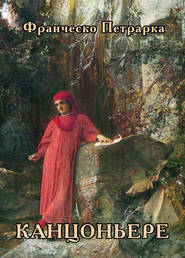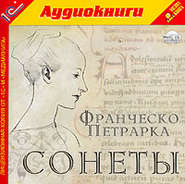По всем вопросам обращайтесь на: info@litportal.ru
(©) 2003-2025.
✖
The Sonnets, Triumphs, and Other Poems of Petrarch
Настройки чтения
Размер шрифта
Высота строк
Поля
I view'd Bellona's minions, famed in fight;
A brotherhood, to whom the circling sun
No rivals yet beheld, since time begun.—
But ah! the Muse despairs to mount their fame
Above the plaudits of historic Fame.
But now a foreign band the strain recalls—
Stern Hannibal, that shook the Roman walls;
Achilles, famed in Homer's lasting lay,
The Trojan pair that kept their foes at bay;
Susa's proud rulers, a distinguish'd pair,
And he that pour'd the living storm of war
On the fallen thrones of Asia, till the main,
With awful voice, repell'd the conquering train.
Another chief appear'd, alike in name,
But short was his career of martial fame;
For generous valour oft to fortune yields,
Too oft the arbitress of fighting fields.
The three illustrious Thebans join'd the train,
Whose noble names adorn a former strain;
Great Ajax with Tydides next appear'd,
And he that o'er the sea's broad bosom steer'd
In search of shores unknown with daring prow,
And ancient Nestor, with his looks of snow,
Who thrice beheld the race of man decline,
And hail'd as oft a new heroic line:
Then Agamemnon, with the Spartan's shade,
One by his spouse forsaken, one betray'd:
And now another Spartan met my view,
Who, cheerly, call'd his self-devoted crew
To banquet with the ghostly train below,
And with unfading laurels deck'd the brow;
Though from a bounded stage a softer strain
Was his, who next appear'd to cross the plain:
Famed Alcibiades, whose siren spell
Could raise the tide of passion, or repel
With more than magic sounds, when Athens stood
By his superior eloquence subdued.
The Marathonian chief, with conquest crown'd,
With Cimon came, for filial love renown'd;
Who chose the dungeon's gloom and galling chain
His captive father's liberty to gain;
Themistocles and Theseus met my eye;
And he that with the first of Rome could vie
In self-denial; yet their native soil,
Insensate to their long illustrious toil,
To each denied the honours of a tomb,
But deathless fame reversed the rigid doom,
And show'd their worth in more conspicuous light
Through the surrounding shades of envious night.
Great Phocion next, who mourn'd an equal fate,
Expell'd and exiled from his parent state;
A foul reward! by party rage decreed,
For acts that well might claim a nobler meed:
There Pyrrhus, with Numidia's king behind,
Ever in faithful league with Rome combined,
The bulwark of his state. Another nigh,
Of Syracuse, I saw, a firm ally
To Italy, like him. But deadly hate,
Repulsive frowns, and love of stern debate,
Hamilcar mark'd, who at a distance stood,
And eyed the friendly pair in hostile mood.
The royal Lydian, with distracted mien,
Just as he 'scaped the vengeful flame, was seen
And Syphax, who deplored an equal doom,
Who paid with life his enmity of Rome;
And Brennus, famed for sacrilegious spoil,
That, overwhelm'd beneath the rocky pile,
Atoned the carnage of his cruel hand,
Join'd the long pageant of the martial band;
Who march'd in foreign or barbarian guise
From every realm and clime beneath the skies
But different far in habit from the rest,
One tribe with reverent awe my heart impress'd:
There he that entertain'd the grand design
To build a temple to the Power Divine;
With him, to whom the oracles of Heaven
The task to raise the sacred pile had given:
The task he soon fulfill'd by Heaven assign'd,—
But let the nobler temple of the mind
To ruin fall, by Love's alluring sway
Seduced from duty's hallow'd path astray;
Then he that on the flaming hill survived
That sight no mortal else beheld, and lived—
The Eternal One, and heard, with awe profound,
That awful voice that shakes the globe around;
With him who check'd the sun in mid career,
And stopp'd the burning wheels that mark the sphere,
(As a well-managed steed his lord obeys,
And at the straiten'd rein his course delays,)
And still the flying war the tide of day
Pursued, and show'd their bands in wild dismay.—
Victorious faith! to thee belongs the prize;
In earth thy power is felt, and in the circling skies.—
The father next, who erst by Heaven's command
Forsook his home, and sought the promised land;
The hallow'd scene of wide-redeeming grace:
And to the care of Heaven consign'd his race.
Then Jacob, cheated in his amorous vows,
Who led in either hand a Syrian spouse;
And youthful Joseph, famed for self-command,
A brotherhood, to whom the circling sun
No rivals yet beheld, since time begun.—
But ah! the Muse despairs to mount their fame
Above the plaudits of historic Fame.
But now a foreign band the strain recalls—
Stern Hannibal, that shook the Roman walls;
Achilles, famed in Homer's lasting lay,
The Trojan pair that kept their foes at bay;
Susa's proud rulers, a distinguish'd pair,
And he that pour'd the living storm of war
On the fallen thrones of Asia, till the main,
With awful voice, repell'd the conquering train.
Another chief appear'd, alike in name,
But short was his career of martial fame;
For generous valour oft to fortune yields,
Too oft the arbitress of fighting fields.
The three illustrious Thebans join'd the train,
Whose noble names adorn a former strain;
Great Ajax with Tydides next appear'd,
And he that o'er the sea's broad bosom steer'd
In search of shores unknown with daring prow,
And ancient Nestor, with his looks of snow,
Who thrice beheld the race of man decline,
And hail'd as oft a new heroic line:
Then Agamemnon, with the Spartan's shade,
One by his spouse forsaken, one betray'd:
And now another Spartan met my view,
Who, cheerly, call'd his self-devoted crew
To banquet with the ghostly train below,
And with unfading laurels deck'd the brow;
Though from a bounded stage a softer strain
Was his, who next appear'd to cross the plain:
Famed Alcibiades, whose siren spell
Could raise the tide of passion, or repel
With more than magic sounds, when Athens stood
By his superior eloquence subdued.
The Marathonian chief, with conquest crown'd,
With Cimon came, for filial love renown'd;
Who chose the dungeon's gloom and galling chain
His captive father's liberty to gain;
Themistocles and Theseus met my eye;
And he that with the first of Rome could vie
In self-denial; yet their native soil,
Insensate to their long illustrious toil,
To each denied the honours of a tomb,
But deathless fame reversed the rigid doom,
And show'd their worth in more conspicuous light
Through the surrounding shades of envious night.
Great Phocion next, who mourn'd an equal fate,
Expell'd and exiled from his parent state;
A foul reward! by party rage decreed,
For acts that well might claim a nobler meed:
There Pyrrhus, with Numidia's king behind,
Ever in faithful league with Rome combined,
The bulwark of his state. Another nigh,
Of Syracuse, I saw, a firm ally
To Italy, like him. But deadly hate,
Repulsive frowns, and love of stern debate,
Hamilcar mark'd, who at a distance stood,
And eyed the friendly pair in hostile mood.
The royal Lydian, with distracted mien,
Just as he 'scaped the vengeful flame, was seen
And Syphax, who deplored an equal doom,
Who paid with life his enmity of Rome;
And Brennus, famed for sacrilegious spoil,
That, overwhelm'd beneath the rocky pile,
Atoned the carnage of his cruel hand,
Join'd the long pageant of the martial band;
Who march'd in foreign or barbarian guise
From every realm and clime beneath the skies
But different far in habit from the rest,
One tribe with reverent awe my heart impress'd:
There he that entertain'd the grand design
To build a temple to the Power Divine;
With him, to whom the oracles of Heaven
The task to raise the sacred pile had given:
The task he soon fulfill'd by Heaven assign'd,—
But let the nobler temple of the mind
To ruin fall, by Love's alluring sway
Seduced from duty's hallow'd path astray;
Then he that on the flaming hill survived
That sight no mortal else beheld, and lived—
The Eternal One, and heard, with awe profound,
That awful voice that shakes the globe around;
With him who check'd the sun in mid career,
And stopp'd the burning wheels that mark the sphere,
(As a well-managed steed his lord obeys,
And at the straiten'd rein his course delays,)
And still the flying war the tide of day
Pursued, and show'd their bands in wild dismay.—
Victorious faith! to thee belongs the prize;
In earth thy power is felt, and in the circling skies.—
The father next, who erst by Heaven's command
Forsook his home, and sought the promised land;
The hallow'd scene of wide-redeeming grace:
And to the care of Heaven consign'd his race.
Then Jacob, cheated in his amorous vows,
Who led in either hand a Syrian spouse;
And youthful Joseph, famed for self-command,














